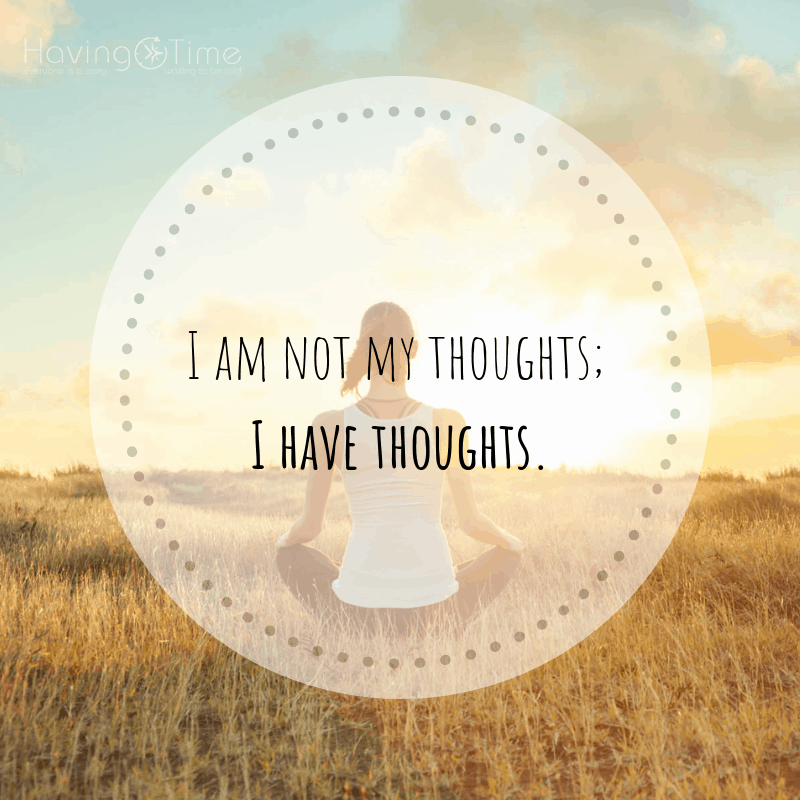It’s very likely that you’ve heard the term ‘mindfulness’ before because in recent years it’s been mentioned more often on TV, radio, and magazines –– because Westerns have discovered the powerful potential of this simple daily practice, which has its origins in Eastern traditions. So what is Mindfulness in a nutshell and how can we practice it in order to lead a stress-free life?

What is Mindfulness?
Mindfulness, in a nutshell, is returning and anchoring your attention with gentle acceptance, from your thoughts to your experience in this passing moment –– and examples include:
- your breathing
- what you see
- your movement as you walk or reach
- your physical sensations
- what you hear, smell, taste or touch
Gentle acceptance of this moment means being aware of your experience without instantly jumping into conclusions, commenting on it, analyzing it, or criticizing it. It is not about resignation, it is about allowing yourself to ‘take it all in’ and just sit with it, observing your thoughts like you would observe the clouds floating by on the sky. It is about fully allowing yourself to experience the reality of the situation. And you do so without commenting onto it in your head, in other words, you invite a little pause, a little silence into your mind during the time.

Experiencing stress is part of being human
Life can feel hectic and overwhelming. We are busy juggling, rushing, nurturing, supporting, working, organizing… and we all experience stress at times.
Stress looks and feels different for each of us. It might feel like your stomach is tied up in knots, a weight is pressing down on your chest, or a heavy tension headache, for example.
Stress can manifest itself in multiple ways, and if we take a few minutes to stand still and observe how we feel when stress arises in our body, we can usually identify tell-tale signals. These are our own, personal stress warning indicators.
Stress is a vague notion in many ways, often compounding multiple emotions all in one. To me, it’s a feeling of unease and agitation, a sense of trepidation and overwhelm, perhaps even an undercurrent of fear. Sometimes, the cause of my stress is clear, but other times it seems to be smaller triggers snowballing into something unmanageable!
Although the way in which we each experience stress might vary, there are some physical symptoms, which we all share.
Stress happens when our fight or flight response is activated to protect us from genuine danger. For example, if we step into oncoming traffic and need to move out of the way rapidly, ‘flight’ is the perfect response. But in modern life, we need to rely on this fight or flight response much less than we used to.
We are unlikely to be chased by predators or face danger several times a day. The trouble is, our mind doesn’t differentiate real from perceived danger. And of course, stress can be caused by a physical or mental threat. If we perceive that there is a risk of being emotionally hurt, this may also fire up the fight and flight response. So what happens then?

When we feel stressed, our mind believes that we are in danger, and a chain reaction gets triggered in our body. Our heart starts galloping and our breathing becomes short and shallow, perhaps even constricted. Our personal stress signals start to rise: sensations of heat or cold, headache, the tension in the abdomen, shoulders rising, jaws tensing, etc. Our body gets us ready to tackle the imminent danger (real or perceived) that we are facing.
How can mindfulness support us in managing stress?
The positive benefits of mindfulness practice on managing stress are increasingly recognized. The Mindfulness-Based Stress Reduction program developed by Jon Kabat-Zinn in 1979 has been adopted widely to support people suffering from stress, anxiety, depression, chronic pain, and other medical conditions.
Mindfulness is the ability to experience the present moment fully, paying attention to what is happening intentionally, and without judging what we find.
Mindfulness is a simple but powerful concept which brings us back to THIS moment. It helps us to tune in to our experiences more deeply as they happen, engaging with them with undivided attention. It teaches us to embrace what comes up, without judging whether it is good or bad.
Throughout our day, our mind tends to wander to the past, wishing a situation had unfolded differently, or projects us into the future, worrying about events and experiences that may, in fact, never happen.
Have you ever felt stressed about an upcoming work presentation, maybe even lost sleep over it, only to deliver it seamlessly the next day?
Imagine what living more often in the present moment could do for us?
What would happen if we were not rehashing past events and not worrying about imaginary future problems? Wouldn’t it feel like we are freeing up a lot of space in our busy mind?
So what are some ways in which mindfulness practices can help us access this more peaceful version of ourselves?
Create preventative self-care routines to help you feel calmer and more grounded
Get to know your stress triggers and signals so that you can keep a watchful eye and intercept the stress chain reaction as it happens before it gains momentum. Journaling is a really helpful way to capture your ‘stress stories’ and allow you to reflect on them. In your regular journaling practice, ask yourself these questions:
- Did I feel stressed today?
- If so, what was the situation?
- Does this situation regularly happen? Is it a recurring source of stress?
How did I recognize that I was starting to feel stressed? What were some of my stress warning signals?
Where did I feel the stress in my body? Did I feel heat or cold anywhere in my body? How did my chest and abdomen feel? What about my jaws and shoulders?
How did I behave when I was feeling stressed? Did I shout, feel impatient, angry?
After a few weeks, you will start noticing patterns and behaviors. You may be able to identify likely triggers and signals and understand what stress feels like to you.
Now all you need to do is develop an awareness of these triggers and signals so that you can catch the stress snowball reaction before it gains momentum.
Practice mindfulness to develop the ability to be present and observe your emotions.
Learn to meditate to train your mind to pay attention to how you are feeling in the present moment. Listen to your mind and body so that you can identify the stress signals as they start arising and choose to take a more purposeful course of action.
Bring mindful actions to your day. Choose an action you do every day: brushing your teeth, cooking, washing the dishes, walking your dog, or anything else. Make a conscious decision to do this action mindfully. If you are brushing your teeth, notice the taste of the toothpaste, the foam forming in your mouth, the motion of the toothbrush on your teeth, and the smoothness of your teeth when you finish. In doing so, you are training your mind to be present.
Learn to pause – take intentional pauses throughout your day to train your mind to observe what is happening at this moment. The easiest way to do this is to schedule these pauses and be intentional about it. Use an alarm on your phone, or associate the pause with an action you take every day. For example, drinking a cup of tea. In this pause, keep your awareness in the present moment by either engaging fully with the action you are taking or by focusing your awareness on your breath for a few deep breaths. Imagine blowing a candle softly as you exhale slowly.
Practice yoga. The benefits of yoga on our physical and mental health are increasingly recognised. Why not try a local yoga class or start a yoga practice at home. Look for a trained teacher and a style of yoga that suits you. Not only will it help your body feel stronger and more flexible, but it will also help you to feel calmer and more grounded.

Learn to use mindfulness to short-circuit the stress response’s snowball reaction
When you are in ‘fight or flight’ mode, feeling your heart racing and stress rising within your body, how can you intercept the chain reaction and respond rather than react to our stress?
Pause: as you notice your mind starting to quiver, and your stress warning signals arising, take a moment to pause and interrupt the chain reaction taking place in your mind and body.
Bring your awareness to your breath. Slowing down the breath helps to calm our mind and move out of fight or flight mode. Start observing your breath. Notice the cool air at the rim of your nostrils as you inhale and the warm air coming out as you exhale. Notice the rise and fall of your chest as you breathe in and out. Follow the breath as if it was a colorful thread coming in through your nose, swirling into your lungs and coming out of the nose. Slowly extend your breath, counting to 4 as you inhale, pausing for 2 at the top of your inhale, exhaling to the count of 6 and pausing for 2 at the end of your exhale. Pay particular attention to this suspended moment of nothingness at the end of your exhale. When your mind wanders, bring it back to your breath as you notice that it has started traveling to the past or the future.
Bring your awareness to your senses. If you still feel that sense of trepidation and agitation, and your heart galloping in your chest, focus your attention to your senses. Look around you and try naming three things you can see, smell, taste, and hear. This will help bring your mind back to the here and now.
Ask yourself: “Am I ok right now?” We can cause stress to ourselves simply by projecting ourselves into an imaginary future where things have gone ‘wrong’. The catastrophes that we create in our mind might in fact never happen. The future doesn’t exist anywhere but in our own mind at this moment. By asking ourselves: “Am I ok right now?” we bring ourselves back to the present moment. Often it helps us realize that at this moment, we are actually ok.
Remind yourself of what is within and outside of your control. Accept that in any situation, there are only so many factors which you can control. Let go of trying to control those which you can’t influence. You can’t change the circumstances and situations you face every day, but you can change your reaction to them. When you experience one of your stress triggers, ask yourself: is this something I control? If it isn’t, try letting it go using the techniques above.
Intercepting the stress chain reaction as it arises is really key. It allows us to tame stress before it gains momentum and overwhelms us completely. Once we are overwhelmed, stress essentially leads our reaction to the situation. Sometimes, it can feel as though our mind has been hijacked and we are not really ourselves.
Mindfulness helps us to develop an awareness of our emotions arising, which allows us to identify stress early. This gives us a great opportunity to intercept the stress reaction using techniques such as those described above. From there, we can return to a calmer state of mind and choose how we want to respond to the situation. Our emotions are no longer controlling our reactions, we are!
Remember that what we do often grows stronger, so the more you practice these techniques, the more efficient you will become at catching stress arising and stopping the chain reaction in its track.
Will Mindfulness eliminate all stress from my life?
Mindfulness is not a magic remedy which will eliminate all stressful situations from our life. It won’t take away the stimulus or triggers which cause us to be stressed. But it will train us to recognize stress arising in our body, and short-circuit its path. It gives us a set of tools to react to stress differently, intentionally. It helps us to find calm and grounding.
Remember that stress is one of the many emotions we experience as human beings. At times, it can be helpful to motivate us and nudge us to take action. It’s how we respond to stress that will determine how much damage it does to ourselves and potentially others around us.
Would you like to practice some of these mindful techniques to bring more calm into your life? If so, join my free 7 Day Stress to Calm Challenge. Over the course of 7 days, you will create new habits, which will give you a taste for what living more mindfully could do for you. It’s entirely free and could be the first step towards a happier you!
photo source | pexels + giphy

